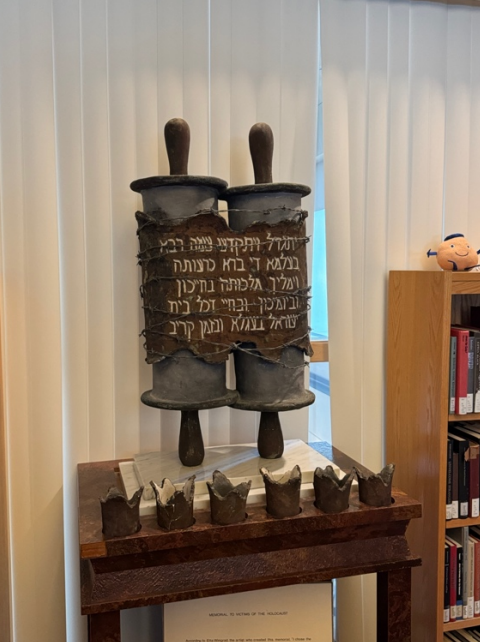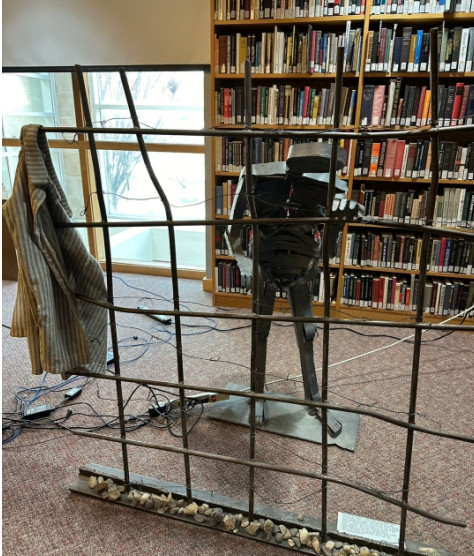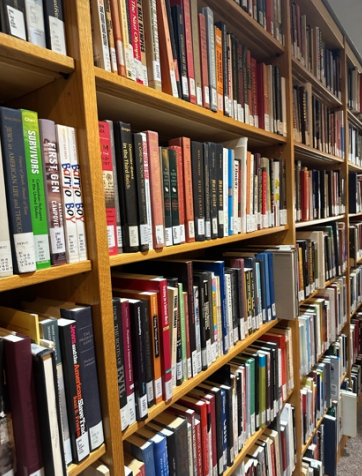Reflections & Responses
Below are responses from those who have visited or worked with the Holocaust Resource Center. We greatly appreciate the time they took to reflect on the time they spent learning with us.

Student 1, GE3000*L03: TRANSFER TRANSITIONS
"Visiting the Holocaust Resource Center was a very moving and thought-provoking experience that impacted me. From the moment I stepped through the door, an air of reverence and solemnity enveloped me. The center's extensive collection of books, newspapers, photographs, and other materials offers a comprehensive and sobering look at one of the darkest chapters in human history. . . . One of the exhibits in the resource center is a memorial to the Holocaust Victims donated by the Jewish Federation of New Jersey. The plaque beneath the monument says it is dedicated to the six million people who died in the Nazi Holocaust. . . . This work has made me deeply feel that people have taken this painful history to heart in various ways and are determined not to repeat such a tragedy. . . . [This] lesson left me with
something that will last for the rest of my life."

Student 2, GE3000*L03: TRANSFER TRANSITIONS
"As I walked into the center, the first interesting key point caught my eyes which was a sculpture of a man imprisoned in prison. The sculpture, named 'THE HOLOCAUST' was created by Elaine Allen, a sculptor of New York and Morristown. It embodied the pain experienced by survivors during the Holocaust, and also evoked my awe for the courage and resilience of survivors in the face of adversity. This sculpture attracted me because it reminded me of the Nanjing Massacre in China, which is also about the brutal genocide. And these brutal histories call for something like this work to ensure that history is not forgotten and condemn the cost of any form of hatred between human beings."
Student 3, GE3000*L03: TRANSFER TRANSITIONS
"[At the Holocaust Resource Center,]I learned about how misinformation and hateful rhetoric were used to dehumanize and vilify certain groups of people, highlighting the dangers of unchecked propaganda in society. It made me reflect on the importance of critical thinking and media literacy in today's world, where misinformation spreads rapidly through digital platforms. Secondly, the emphasis on the importance of remembrance and education in preventing similar atrocities in the future resonated deeply with me. The idea that by learning about and acknowledging the past, we can work towards building a more compassionate and tolerant society struck a chord. It reinforced that education is a powerful tool for promoting empathy and understanding among individuals from diverse backgrounds. . . . It left an indelible mark on my consciousness and reinforced my commitment to lifelong learning and activism."

Student 4, GE3000*L03: TRANSFER TRANSITIONS
"One point that made a deep impression on me is that prejudice was a crucial factor in causing the Holocaust. The spread of Nazi ideology established the belief that Jews were an inferior race. Prejudice is like an invisible seed that takes root in people's hearts, regardless of the facts. This distorted perception ultimately led to the Holocaust. I also learned that the Holocaust's aftermath is heartbreaking. Six million Jews perished, and countless cultural artifacts, texts, and artworks were destroyed. These outcomes are profound; our current duty is to preserve world peace and prevent war."
Student 5, GE3000*L03: TRANSFER TRANSITIONS
"Reflecting on my experience in this visiting, it was a poignant and deeply educational journey. The combination of historical artifacts, personal stories, and evocative artwork provided a comprehensive understanding of the Holocaust's impact. It was a potent reminder of the depths of human cruelty and the indomitable spirit of those who resist it. The center did an exceptional job of presenting a complex and painful chapter in history with respect, depth, and sensitivity. This visit [provided] me [with] an emotional encounter that shows the importance of remembrance and education in the fight against forgetting the past."
Student 6, GE3000*L03: TRANSFER TRANSITIONS
"This visit experience is worth remembering. From the materials I saw at the Holocaust Resource Center..., I felt the great power of human beings in this world. These forces can be both beneficial to humanity and harmful to the development of society and nature. Power itself is not terrifying but depends on how humans use it. If we just sit in the classroom and watch these materials or works, we may not feel any additional shock on them."
Student 7, GE3000*L03: TRANSFER TRANSITIONS
"[There were] the narrative of survivors. I [found] survivor stories from the Holocaust really interesting. They're powerful because they let us hear directly from people who lived through those terrible times. Survivors tell us about the strength and bravery they showed, as well as the suffering they endured. Their stories remind us of the awful things that happened and the long-lasting pain it caused. These stories are important for teaching future generations about what happened and how to be more understanding and compassionate. Personally, I [was] deeply moved by the courage of survivors who share their stories, making sure we never forget the lessons of the Holocaust. . . . I [was] deeply moved by my experience at the Holocaust Resource Center. Learning about the Holocaust and hearing survivor stories has been very emotional for me. [It] made me think a lot about the importance of remembering history and standing up against injustice. I'm grateful for the opportunity to learn and reflect on such an important part of our past, and it [has] inspired me to do my part in promoting tolerance and understanding in the world."
Student 8, Post-Baccalaureate Certificate in Teaching the Holocaust and Prejudice Reduction
"On the very first meeting of these classes, you asked, 'What do we want to get out of these courses and why are we here?' At the time my intention was to learn more about the Holocaust to be able to address people comparing small inconveniences to experiences of the Holocaust. I wasn’t sure if I was going to be able to incorporate any of the material into my classroom nor was I aware of the mandate to do so. I had no idea what to expect in Prejudice Reduction in the Classroom.
I can honestly say that these courses have been the most beneficial to my growth as an educator and as a person. Through these courses, I have not only gained a deeper understanding of historical events and societal issues but have also discovered insights about myself, my school district, and people in general.
Through these courses I've realized that it is possible to handle challenging and sensitive subjects in the classroom, even ones that seem daunting, such as incorporating the Holocaust into a Biology curriculum. This program strengthened my confidence to be able to present sensitive and challenging concepts in the classroom. I've come to understand that with the right knowledge, approach, and sensitivity, it's not only possible but incredibly valuable to address such topics in the educational setting.
I've gained a deeper understanding of society by exploring prejudice and its effects. I think the German word 'Weltschmerz' (literal translation: world-pain) could express my feeling – a poignant awareness of the pain and suffering in the world. Each topic I delved into, initially expecting to create simple classroom projects, opened a Pandora's box of complex issues. From systemic racism to sexual harassment, health inequities, and beyond, I found myself confronted with the harsh realities of societal injustices. However, amidst this realization, I also discovered a newfound sense of purpose and opportunity. I now understand that as an educator, I have a unique platform and opportunity to address these deeper issues with my students. By incorporating discussions on prejudice, inequality, and social justice into my teaching, I can empower my students to critically analyze the world around them and become agents of positive change. It has ignited a passion within me to embark on a new journey into public health, leveraging my role as an educator to make a meaningful difference in the lives of my students and beyond. I’m so excited to be participating in the CDC Fellowship this summer and I think my experiences in these courses helped my application.
Throughout the duration of the program, we were fortunate to hear from a diverse array of guest speakers, each offering unique perspectives and insights that deeply impacted my understanding of the subjects at hand. One of the most powerful and moving experiences was listening to a Holocaust survivor share their story. Their firsthand account brought the history we had been studying to life in a way that textbooks and lectures could never fully convey. We have talked about inclusion of witness testimony and the future of it. I feel privileged to have listened to the stories of survivors first hand. Additionally, the LGBTQ speakers provided invaluable perspectives, enriching our discussions on prejudice and discrimination. Learning about relevant laws, especially as a yearbook adviser, was particularly beneficial. I wish my administration could have been as knowledgeable and concise about the application of the law.
I cannot emphasize how much I’ve enjoyed these classes while learning so much at the same time. The in person classes had such great discussions and I really enjoyed engaging with colleagues from various subject areas. I firmly believe that courses of this nature should be mandatory for all educators, as they equip us with invaluable knowledge and skills essential for creating inclusive and empathetic learning environments. Should these courses be offered again, I will enthusiastically recommend them to my coworkers without hesitation.Thank you so much for taking your time to instruct them."
Student 9, Post-Baccalaureate Certificate in Teaching the Holocaust and Prejudice Reduction
"As the semester draws to a close, I find myself reflecting on the invaluable lessons and experiences I've gained under your mentorship over the past two years. It is with deep gratitude and a tinge of nostalgia that I write this letter to express my heartfelt appreciation for everything you have taught me and the profound impact you have had on my journey as a learner, educator, and a human being.
From the very first class, I knew I was in the presence of a master educator. Your passion for teaching and your dedication to making the world a better place through education were palpable in every lecture, discussion, and activity we engaged in. Your wealth of knowledge and your ability to convey complex concepts with clarity and enthusiasm never ceased to amaze me.
What truly set you apart, however, was your unwavering commitment to practical application. The activities and projects you designed were not merely academic exercises; they were carefully crafted to empower us to take what we learned and apply it in our own classrooms and districts. Despite the labor-intensive nature of some of these projects, their real-world relevance and transformative potential made every moment of effort worthwhile.
Beyond the academic realm, you served as an inspiration and a role model to me and to all of your students. Your boundless enthusiasm, your genuine concern for our growth and development, and your unwavering belief in our potential challenged us to reach new heights and exceed our own expectations. In a world where true gems of educators are rare, you shine brightly as a beacon of excellence and dedication.
As I prepare to embark on the next chapter of my journey, I carry with me not only the knowledge and skills you have imparted, but also the indelible mark you have left on my heart and mind. I am profoundly grateful for the privilege of being a part of your class and for the opportunity to learn from someone as remarkable as you.
Though our paths may diverge for now, please know that your influence will continue to guide and inspire me in all my future endeavors. Thank you, from the bottom of my heart, for being such an amazing teacher and individual."